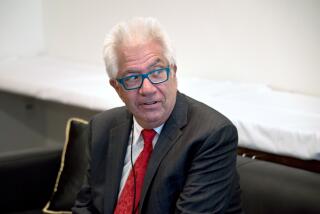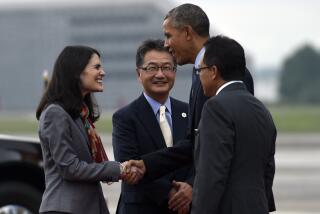State Dept. Shift Expected in Asian Policy Shake-Up
- Share via
WASHINGTON — The Bush Administration reportedly is bringing in a career diplomat with extensive experience in Japan to take charge of Asia policy at the State Department. The move is part of a broader shake-up of American officials and diplomats dealing with the Pacific Rim.
According to State Department and congressional sources, U.S. Ambassador to India William Clark Jr. will soon be brought back from New Delhi to become assistant secretary of state for East Asia and the Pacific. He will replace Richard H. Solomon, the current assistant secretary, who reportedly is in line to become U.S. ambassador to the Philippines.
State Department spokesman Richard Boucher said that he did not know about the reported changes and Solomon said he would have no comment.
The move will put a Japan specialist in one of the senior Bush Administration posts for Asia at a time when U.S. relations with Tokyo are at a particularly sensitive stage. More by coincidence than by design, the Administration’s top policy-makers for Asia at the State Department, Pentagon and National Security Council at the moment primarily are specialists on China.
Clark, 61, served as an American diplomat in Japan from 1970 to 1974 and again from 1981 to 1985. He also did stints in Washington as head of the State Department’s Japan desk and as the deputy assistant secretary of state in charge of Japan and Korea.
His expected appointment is one of a series of upcoming changes in key personnel at the State Department and at U.S. diplomatic posts overseas. The current ambassador to Manila, Frank J. Wisner, reportedly is being brought back to Washington, and two sources said that he may be appointed to the senior job of undersecretary of state for international security affairs.
Some reports circulating in Washington said U.S. Ambassador to Japan Michael Armacost also may be leaving soon. Armacost, who replaced longtime U.S. Ambassador Mike Mansfield in Tokyo in 1989, has been noteworthy for his willingness to take a tough public stance with the Japanese government, particularly during the dispute over its contributions to the Persian Gulf War.
However, one State Department official said that Armacost is not being replaced and another source said that he will stay on in Tokyo at least for another year or so. If Armacost leaves, one of the top candidates being mentioned as a potential successor is Gaston J. Sigur Jr., a Japan specialist who served as head of Asia policy at the National Security Council and the State Department in the Ronald Reagan Administration.
More to Read
Sign up for Essential California
The most important California stories and recommendations in your inbox every morning.
You may occasionally receive promotional content from the Los Angeles Times.













